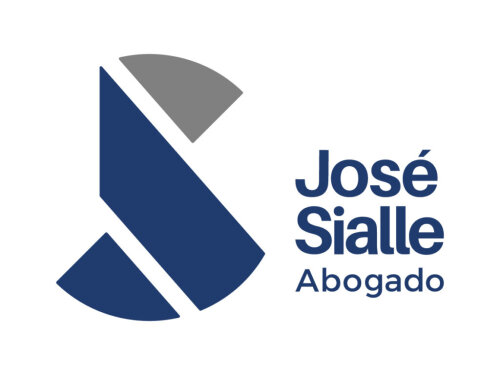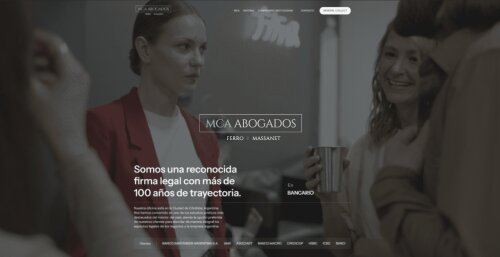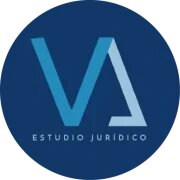Best ADR Mediation & Arbitration Lawyers in Córdoba
Share your needs with us, get contacted by law firms.
Free. Takes 2 min.
List of the best lawyers in Córdoba, Argentina
About ADR Mediation & Arbitration Law in Córdoba, Argentina
Alternative dispute resolution - ADR - refers to processes outside ordinary court litigation that resolve disputes through methods such as mediation and arbitration. In Córdoba, Argentina, ADR plays an increasingly important role in civil, commercial and administrative matters. Mediation is often promoted as a faster, less confrontational and private way to reach negotiated agreements. Arbitration is a private adjudication process where parties submit disputes to one or more arbitrators whose decision - the award - is binding and, except in narrow cases, enforceable by the courts.
Both mediation and arbitration operate under a mix of national rules, the Argentine Civil and Commercial procedural framework, international treaties such as the New York Convention for enforceability of foreign awards, and provincial implementation and practice in Córdoba. Parties can choose institutional ADR centers or ad hoc procedures tailored to their needs.
Why You May Need a Lawyer
Engaging a lawyer experienced in ADR is important in several common situations:
- Drafting dispute resolution clauses - A lawyer can draft clear arbitration clauses and mediation agreements that specify seat, governing law, number of arbitrators, language, procedure and enforcement mechanisms.
- Deciding whether ADR is appropriate - Counsel can assess whether your dispute is suitable for mediation or arbitration given facts, legal issues, need for interim relief, or public interest concerns.
- Representation during mediation - A lawyer prepares you for negotiation, helps present your position, evaluates settlement offers and ensures that any agreement is legally sound and enforceable.
- Representation in arbitration - Lawyers prepare submissions, select arbitrators, argue legal and evidentiary points, and protect procedural rights throughout the arbitral process.
- Enforcing or challenging awards - After an award is issued, a lawyer can seek judicial recognition and enforcement in Argentina or advise on narrow grounds for annulment or refusal of enforcement.
- Protecting evidence and seeking provisional measures - Counsel can ask courts for interim relief where required to preserve rights pending ADR, or advise on available measures under arbitration rules.
Local Laws Overview
Key legal aspects relevant to ADR in Córdoba include:
- Mandatory mediation and procedural incentives - In Argentina, mediation has been encouraged and in some forums made a prerequisite or procedural step before litigation. Córdoba courts and administrative bodies may require or recommend mediation in certain matters - for example in civil and family disputes or neighborhood conflicts - so check local procedural rules before filing suit.
- Arbitration as a matter of party autonomy - Arbitration is largely governed by party agreement. Parties can choose institutional rules or agree an ad hoc process. The provincial judiciary in Córdoba enforces arbitration agreements and awards subject to the limits of public policy and procedural safeguards.
- Enforceability of domestic and foreign awards - Argentina is a party to the New York Convention. This facilitates recognition and enforcement of foreign arbitral awards in Argentine courts, including Córdoba, subject to the Convention's limited defenses and local procedural requirements.
- Confidentiality and privacy - ADR procedures are generally more private than court processes. Arbitration proceedings and awards are typically private, though certain awards can become public when enforcement or annulment actions are filed with courts.
- Limits on arbitrability - Some matters - for instance certain criminal matters, absolute public regulatory matters or issues affecting fundamental public order - may not be arbitrable. A lawyer can advise on whether a given dispute is suitable for arbitration under Argentine and provincial law.
- Local institutional rules and centers - Córdoba has private and institutional forums offering mediation and arbitration services - for example chambers of commerce, university dispute resolution centers and private arbitration institutions. Each institution will have its own rules on appointment of arbitrators, timelines and fees.
Frequently Asked Questions
What is the difference between mediation and arbitration?
Mediation is a facilitated negotiation led by a neutral mediator who helps the parties reach a voluntary agreement. The mediator does not impose a decision. Arbitration is a private adjudication where arbitrators hear evidence and make a binding decision - the award - which the courts can enforce.
Are mediations or arbitrations mandatory in Córdoba?
Some types of disputes and some procedural tracks encourage or require mediation as a prior step. Arbitration is generally consensual - it becomes mandatory only if parties contractually agree to resolve disputes by arbitration. Always check the specific court or administrative rules that apply to your matter in Córdoba.
How do I choose between institutional arbitration and ad hoc arbitration?
Institutional arbitration follows established rules and administrative support from an arbitral center - this can bring predictability, fixed fee rules and assistance in appointing arbitrators. Ad hoc arbitration is more flexible and often cheaper but requires parties to agree detailed procedural rules and appointment mechanisms. A lawyer can help choose the right format based on complexity, cost sensitivity and enforcement needs.
Can an arbitration award be challenged in Córdoba courts?
Yes, awards can be challenged but only on limited grounds - for example, lack of a valid arbitration agreement, violation of due process, arbitrators exceeding their powers, or conflict with public policy. The grounds and procedure for annulment or refusal of enforcement are narrow, so legal counsel is important.
Are ADR agreements enforceable against third parties?
Generally, ADR agreements bind the signatory parties. Enforceability against third parties depends on whether the third party has consented or is otherwise bound by the contract. Special rules may apply to consumers or when third-party rights are involved.
How long does arbitration or mediation usually take in Córdoba?
Timelines vary widely. Mediation can take from a single session to several weeks depending on complexity and willingness to negotiate. Arbitration timelines depend on agreed rules, number of hearings and procedural steps - from a few months for simple cases to a year or more for complex disputes. Institutional rules often provide estimated timelines.
How much does ADR cost compared to litigation?
Costs depend on the procedure, amount in dispute, complexity, number of parties and fees charged by mediators, arbitrators and counsel. ADR can be less expensive than prolonged litigation, especially because it can shorten the dispute life-cycle. However, complex arbitrations with multiple arbitrators and extensive expert evidence can be costly. Ask institutions for fee schedules and get fee estimates from counsel.
Can I represent myself in mediation or arbitration?
Parties can represent themselves, but legal representation is strongly recommended, particularly in arbitration or in complex mediations, to protect legal rights, draft enforceable settlement terms and handle procedural or substantive legal issues.
What is the role of the seat of arbitration?
The seat determines which national courts have supervisory jurisdiction over the arbitration and which procedural law governs judicial aspects such as enforcement or annulment. Choosing an appropriate seat - for example Córdoba or another Argentine jurisdiction - is a strategic decision that affects enforcement and applicable legal standards.
How do I enforce an arbitration award in Córdoba?
To enforce an award, you typically file the award before the competent civil or commercial court to obtain recognition and execution. For foreign awards, the New York Convention framework applies, and courts will review limited defenses. A local lawyer can prepare the enforcement petition and handle court follow-up.
Additional Resources
For authoritative information and assistance, consider contacting the following types of organizations and bodies in Córdoba and Argentina:
- Poder Judicial de la Provincia de Córdoba - offices or departments that handle mediation programs and court procedures.
- Colegio de Abogados de Córdoba - the provincial bar association for referrals to lawyers experienced in ADR and for professional guidance.
- Ministerio de Justicia y Derechos Humanos de la Nación - for national programs, guidance on mediation frameworks and public policies.
- Local chambers of commerce and business associations - many operate mediation or arbitration centers or offer referral lists of arbitrators and mediators.
- University law clinics and dispute resolution centers - these can provide information, training programs and sometimes low-cost services.
- Private institutional ADR centers - courts and professional bodies often list recognized centers that administer arbitrations and mediations.
Next Steps
If you need legal assistance in ADR in Córdoba, follow these practical steps:
- Gather key documents - compile contracts, communications, invoices, witness names and any evidence that explains the dispute.
- Determine urgency and relief needed - consider whether you need provisional measures to preserve assets or evidence and whether a court application is required before or during ADR.
- Check for mandatory mediation rules - verify whether your dispute or forum requires mediation as a precondition to litigation.
- Consult a lawyer experienced in ADR - seek a lawyer who advises on mediation strategies, arbitration clauses, institutional rules and enforcement. Ask about experience with Córdoba courts and local arbitral centers.
- Consider drafting or revising dispute resolution clauses - if you are negotiating contracts, include clear ADR clauses specifying seat, language, law, arbitrator selection and institutional rules.
- Choose the ADR path - with your lawyer, assess whether mediation or arbitration - or a combination - is most appropriate based on cost, confidentiality, speed and enforceability.
- Select mediators or arbitrators carefully - check qualifications, experience and potential conflicts of interest. Institutional rules can assist with appointments.
- Prepare for the process - work with counsel to prepare submissions, settlement positions and evidence. In mediation, prepare realistic settlement boundaries; in arbitration, prepare procedural strategies and witness testimony.
- Follow up on enforcement - if you obtain an award or settlement, ensure it is properly formalized and, if needed, proceed with judicial enforcement in Córdoba or other jurisdictions.
If you are unsure where to start, contact the Colegio de Abogados de Córdoba for referrals to ADR specialists and request an initial consultation to evaluate your case and options.
Lawzana helps you find the best lawyers and law firms in Córdoba through a curated and pre-screened list of qualified legal professionals. Our platform offers rankings and detailed profiles of attorneys and law firms, allowing you to compare based on practice areas, including ADR Mediation & Arbitration , experience, and client feedback.
Each profile includes a description of the firm's areas of practice, client reviews, team members and partners, year of establishment, spoken languages, office locations, contact information, social media presence, and any published articles or resources. Most firms on our platform speak English and are experienced in both local and international legal matters.
Get a quote from top-rated law firms in Córdoba, Argentina — quickly, securely, and without unnecessary hassle.
Disclaimer:
The information provided on this page is for general informational purposes only and does not constitute legal advice. While we strive to ensure the accuracy and relevance of the content, legal information may change over time, and interpretations of the law can vary. You should always consult with a qualified legal professional for advice specific to your situation.
We disclaim all liability for actions taken or not taken based on the content of this page. If you believe any information is incorrect or outdated, please contact us, and we will review and update it where appropriate.












